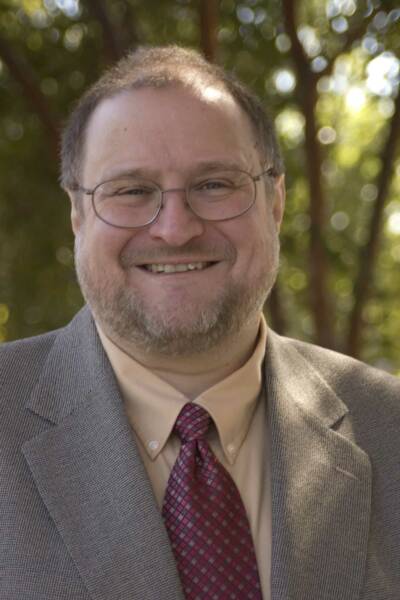Friday afternoon sunlight streams through the stained glass windows of the cathedral’s Parish Hall. The rustling of the trees outside the windows makes the shadows of color dance on the large canvas that covers the floor. Printed on the canvas is a life-size replica of the medieval Labyrinth from the Cathedral of Chartres.
As I pull off my shoes and start walking the Labyrinth, I find the stillness of the Parish Hall to be in sharp contrast to the noisiness inside my head. It’s the end of a very full workweek, and the daily stresses of my job are still jangling about in my brain. The physical act of walking the Labyrinth, with its curves and twists and turns, becomes an act of meditation, occupying my body and eventually my mind, as I go within my self, to see what noisy distractions I need to leave behind.
I begin to breathe rhythmically as I walk, and the centering prayer that presents itself to my mind is one my priest had suggested during Advent:
“For You alone, O Lord, my soul in silence waits.”
As I repeat the prayer like a mantra, coordinating it with my breath, I find myself stuck on the word “Lord,” which suddenly seems so patriarchal. The images of God that speak to me the most are images of a motherly, compassionate God. The word “Lord” has a lot of baggage for me, an image left over from my fundamentalist childhood — the image of a stern “Lord” who wants our submission, not our love.
I turn another corner of the Labyrinth and I think back several years to a personal retreat at the Monastery in Conyers, Georgia, where I sat in the majestic church as the monks chanted the Psalms. The chanting was beautiful — until I picked up the prayer book and read along. The Psalms they were chanting were songs of judgment, of celebrating the violent defeat of enemies. They seemed to be in stark contradiction to the words of Jesus in the Gospels. How in the world could these Psalms be reconciled with Jesus’ message of love and nonviolence in the Sermon on the Mount?
After waging a fierce theological battle in my mind, I finally relaxed and allowed myself to focus on the rhythm and the beauty of the chanting itself, rather than the meaning of the words. I let the ancient words flow over me and through me, without stopping to examine them along the way. Soon I was transported to a deep inner place where I could experience the loving presence of God — an actual presence, not a theological construct bound by words.
Now, as I walked the Labyrinth on this Friday afternoon, I realized I was defining this word, “Lord,” in terms of my past ideas, rather than by the realities of the present. “Lord” implies submission — but rather than submitting like a slave to a master, I can choose to submit to God as I would submit myself to a lover. I can joyfully abandon myself to the compassionate God whose presence I have felt so many times. I don’t have to get hung up on the old concepts of God that don’t match the reality, the God whose love and acceptance I have felt like a strong gentle force in my life.
“For You alone, O Lord…” As I walk the Labyrinth I give myself wholly to God, trusting God’s Spirit to fill me and calm me, to move me from chronos (chronological time) to kairos (the moment, the eternal Now).
“…my soul in silence waits.” I abandon myself to God’s presence, moving past my self-doubts and into God’s loving acceptance. Soon all the noisy distractions inside me are silenced, and I can glimpse a much greater Reality.
The Labyrinth itself is another reality — a geometric space that curves in on itself and appears meandering and chaotic but is actually orderly and purposeful. And like the journey of our lives, it is not a maze, with trick corners and dead ends, but a Labyrinth, beautifully designed and bearing the inherent signature of the Designer, providing direction and guidance as we journey toward the center.
Walking the Labyrinth is a solitary meditative practice, but I love sharing the experience with my friends. Walking it with friends, at times they’re side by side with me, close enough to touch, and at times they’re far away on the opposite side of the pattern. But the Labyrinth always leads us back together, for no matter where we are in the journey, we are all on the same Path.

A licensed professional counselor in private practice in metro Atlanta, Darrell Grizzle is the author of I Never Meant to Start a Murder Cult and Other Stories.
